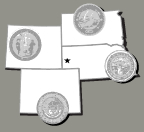Government Policy
Affecting the Cattle Industry
by Troy Smith for Angus Productions Inc.
MITCHELL, Neb. (Nov. 29, 2011) — Kicking off the opening session of Range Beef Cow Symposium XXII Tuesday, Nov. 29, U.S. Senator Mike Johanns (R–Neb.) spoke to the audience by Internet transmission from Washington, D.C. The senator addressed several public policy issues and expressed concern over efforts by government agencies to impose excessive regulation on agricultural producers.
Johanns mentioned specifically USDA’s attempt to impose broad regulation, through the proposed rule by the Grain Inspection Packers & Stockyards Administration (GIPSA), which could hinder marketing opportunities for cattle producers.
“It went too far,” stated Johanns. “But Congress has said to USDA that the proposed rules went beyond the intent of Congress.”
Johanns also lamented the “mixed signals” coming from the Environmental Protection Agency (EPA) regarding regulation of farm dust. It created much uncertainty over the agency’s true intentions. Threatened with proposed legislation that would limit its regulatory power, explained Johanns, the EPA finally clarified its position, saying it will not try to regulate farm dust.
Johanns cited other examples of regulatory overreach, including attempts to broaden the definition of “waters of the United States,” which might make farm ponds and stock tanks subject to regulation by the Corps of Engineers. Another proposal related to child labor regulations promised to restrict the ability of young people to work part-time on local farms and ranches.
The latter proposal, said Johanns, might prohibit farm and ranch youth from helping work cattle or engaging in activities associated with 4-H and FFA. He urged producers to contact their congressional representatives and senators to register comment before the comment period ends Dec. 1.
On the positive side, Johanns praised the recent adoption of trade agreements with Japan, South Korea and Colombia. The agreements, he said, should create new jobs and increase access to markets for U.S. beef.
Johanns said the biggest challenge ahead is reining in government spending. He noted how, as governor of Nebraska, he had to work with legislators to balance the state budget.
“What a remarkable concept — a balanced budget,” stated Johanns, saying that’s what is needed at the federal level. “We have to make tough choices and rein in spending. We can no longer afford to kick the can down the road.”
The biennial Range Beef Cow Symposium was hosted Nov. 29-Dec. 1 at the Mitchell Events Center, Mitchell, Neb., by the cooperative extension and animal science departments of the University of Nebraska-Lincoln, South Dakota State University, Colorado State University and the University of Wyoming. Comprehensive coverage of the event is provided online at www.rangebeefcow.com, an event coverage site provided by Angus Productions Inc. (API), publisher of the Angus Journal and the Angus Beef Bulletin.
Editor’s Note: API's coverage of the event is made available for distribution to all media via an agreement with the Range Beef Cow Symposium Committee and API. Headquartered in Saint Joseph, Mo., API publishes the Angus Journal, the Angus Beef Bulletin, the Angus Beef Bulletin EXTRA, and the Angus e-List, as well as providing online coverage of events and topics pertinent to cattlemen through the API Virtual Library. For questions about this site, or to notifiy us of broken links, click here.

